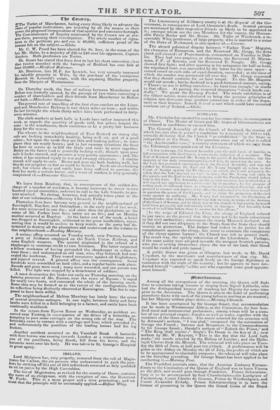awn -A a: D.
Mr. Chisholm has vacated his seat for Inverness-shire, in consequence of illness. The Master of Grant and Mr. Grant of Glemnorriston are mentioned as candidates to succeed him.
The General Assembly of the Church of Scotland, the session of which bus just closed, passed a resolution by a majority of 15:1 to 142, virtually declaring that the Church " as established " by the State is independent of the State. The question arose out of what is called " the Auehterarder case ;" a concise statement of which we copy from the Edinburgh correspondence of the Conrier- " A few years ago, the General Assembly gave the male heads of families in full communion with the Cloud.. a veto out the induction of a minister. The Earl of Kinnoul presented Mr. Young to the parish of Auchterarder ; but the maks ity of the male communicants tokodl hi a, by exercising the veto. As the Vem Act proveeded exclusivek fiodi the General Assembly, and was not ratified by Parliament, the Kul and Mr. \' bug brought an action in the Court of Session against the Pr.-bytrry ; mum which the Court u timately de- cided, that the Veto Aet had no toe, lii law ; that Mr. Young had right to the parish, and the Earl to the eniol j ineots, mail the Presbytery should induct him in due form. The Assembly, on the present oceasiam, has re,olved that it will regard any application to a civil coin t by its members, for the purpose of setting aside its Nadi-made laws, as a h. each ,,fecclesa.stieal discipline, and will proceed to censure and deprive of his office the individual who thus dares to call in question the power of tl:e Church, al.l t dab.' the protection of the civil court against its authonty. Mr. Young bad intimated to the Presbytery of Auchterarder, that it they refused to t die him on trial, in terms of the decisiou of the Court of Session, and to admit him to the ellurch of that parish, he would hold them perstmally and individually liable in The Ass,mbty have resolved to call him before them to answer for this offence."
[In the reign of Edward the First, the clergy of England refused to pay taxes, on the ground that they welt' not to be made subservient to the civil authorities ; whereupon the sturdy Monarch declared, that if they did not owe allegiance to the State, from the State they should receive no protection. The Judges had orders to do justice for all complainants against the clergy, but never to entertain the complaints of the clergy against laymen : the Church was left to protect itself. The result was, the speedy submission of the Churchmen. Perhaps, if the same policy were adopted towards the arrogant Scottish parsons, who aim at setting themselves above the law of the land, their blood would be cooled and pride tamed.]
A public dinner was given at Glasgow, last week, to Mr. David Urquhart, by the merchants end manufacturers of that city. Mr. Urquhart was expected to speak freely on the foreign diplomacy in connexion with the trade of tile country ; but be appears to have con- ducted himself "cannily "—like one who expected some good appoint- ment himself.


























 Previous page
Previous page